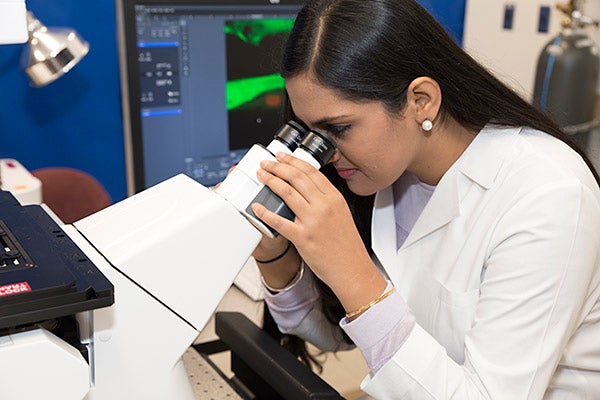New minors provide the human side of health care
East Carolina University’s Thomas Harriot College of Arts and Sciences is helping students become more compassionate health care providers. This fall, the college will implement coursework for three new medically oriented minors in medical anthropology, medical humanities and medical sociology.

ECU students may extend their understanding of compassionate health care through three new minors in the Thomas Harriot College of Arts and Sciences. (Photo by Cliff Hollis)
“These new minors are deeply rooted in the liberal arts, as students will study how health care is situated in broader social, cultural, ethical, religious and literary contexts,” said Dr. Allison Danell, dean of Harriot College.
Medical Anthropology
The medical anthropology minor will develop students’ understanding of health and disease from the perspective of human cultural and biological diversity. It is designed to give students the skills to think critically about the biocultural basis of health and disease; and the sociocultural connection with health and disease; and provide the practical basis for developing culturally competent health care programs. The curriculum includes core courses in “Introduction to Biological Anthropology” (ANTH 2015), “Biological Anthropology Lab” (ANTH 2016), “Introduction to Cultural Anthropology” (ANTH 2200) and “Medical Anthropology” (ANTH 3252).
“Students will apply knowledge of biological, psychological and sociocultural approaches to health and disease; apply ethnographic research techniques in investigating and analyzing health and disease issues; and analyze health and disease issues among today’s culturally and ethnically diverse human populations,” said Dr. Eric Bailey, a professor of anthropology and director of the medical anthropology minor.
Medical Humanities
The minor in medical humanities includes core courses in “Biomedical Ethics” (PHIL 2276) and “Religion and Healthcare” (RELI 2360), with additional elective courses exploring literature, communication and writing relating to health care and medicine, including “Scientific Writing” (ENGL 3820) and “Spanish for the Health Professions” (SPAN 3110).
“For more than a century, educators have promoted medical humanities as a core part of medical education to help all kinds of health care practitioners deepen their awareness of the ways people engage with health and illness in meaningful ways,” said Dr. Derek Maher, chair of philosophy and religious studies and coordinator of the medical humanities minor. “The minor supports learning that is useful and applicable across all careers in health care.”
Medical Sociology
The curriculum for the medical sociology minor requires students to take courses that will develop their expertise in both the social dimensions of health and medicine in “Introductory Medical Sociology” (SOCI 3327) and “Social Aspects of Death and Dying” (SOCI 5318), and courses in core sociological concepts and methods, including “Methods of Research” (SOCI 3213).
“Sociology has been included on the Medical College Admissions Test (MCAT) since 2015, so future physicians will benefit greatly from completing this minor,” said Dr. Lori Heald, teaching assistant professor of sociology and coordinator of the medical sociology minor.
The medical sociology minor will help prepare students for careers in public health, public policy and social services.
“Folks depend on health care professionals to provide more than a procedure or prescription. They are seeking humanity and understanding,” said Danell. “These minors will support our many pre-health professional students at ECU to reach their goals of becoming compassionate and inclusive health care providers.”
For questions about these minors or any other Harriot College programs, contact Associate Dean for Academic Programs Jean-Luc Scemama at scemamaj@ecu.edu.